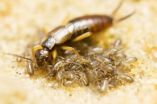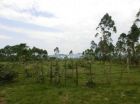(Press-News.org) Depending on our food cravings, the number of items served, and even the time of day, ordering a meal at a restaurant often requires a "narrowing down" decision making process. According to a new study in the Journal of Consumer Research, restaurants that now provide "low-calorie" labels on their menus can inadvertently cause people to eliminate healthy foods right off the bat.
"Because most restaurant menus are quite complex—offering numerous dishes composed of multiple ingredients—diners try to simplify their decision. People have come to expect low-calorie food to taste bad or not fill them up," write authors Jeffrey R. Parker (Georgia State University) and Donald R. Lehmann (Columbia University). "We propose that by calorie organizing a menu, restaurants make it easier for people to use the general 'low-calorie' label to dismiss all low-calorie options early in the decision process."
In four online studies, the authors asked participants to order food from menus similar to what they might encounter at well-known chain restaurants. Some participants were shown traditional menus that listed available dishes in food-type categories (with no calorie information on the menu). Another set of participants was given the same menus, but with calorie information provided by each dish. A third group was given the calorie-labeled menus with the low-calorie dishes grouped together and given a low-calorie section label.
Study results showed that the participants who were given the traditional menus without any calorie information and the menus with the low-calorie food grouped together ordered food with similar amounts of calories. Interestingly, the participants who ordered from the calorie-labeled (but not grouped) menus ordered meals with fewer calories overall.
"When a menu is calorie posted but not calorie organized, it is less likely that the caloric-content of the dishes will be used as an initial filter for eliminating large portions of the menu," the authors conclude. "For the consumer, this means you are more likely to consider ordering a low-calorie dish and also more likely to eat it too."
INFORMATION:
Jeffrey R. Parker and Donald R. Lehmann. "How and When Grouping Low-Calorie Options Reduces the Benefits of Providing Dish-Specific Calorie Information." Journal of Consumer Research: August 2014. For more information, contact Jeffrey R. Parker or visit http://ejcr.org/.
Low-calorie restaurant menus: Are they making us fat?
2014-04-15
ELSE PRESS RELEASES FROM THIS DATE:
More should be done for female parolees
2014-04-15
EAST LANSING, Mich. --- As the female prison population grows, a new study funded partly by the National Science Foundation says more should be done to help women probationers and parolees in poor urban areas remain crime-free.
A team of Michigan State University criminologists found black women on probation and parole feel they have little choice but to isolate themselves in their homes or risk getting caught up in the type of criminal activity that got them in trouble in the first place.
Probation and parole officers, case managers and others should help the women ...
When identity marketing backfires: Consumers don't like to be told what they like
2014-04-15
When choosy moms choose Jif peanut butter and sports fans who call themselves sports fans subscribe to DirecTV, identity marketing is hard at work. But what happens when this type of advertising misses the mark? According to a new study in the Journal of Consumer Research, when a person's sense of ownership and freedom is threatened they are less likely to respond positively to identity marketing campaigns.
"While people may be drawn to brands that fit their identity, they are also more likely to desire a sense of ownership and freedom in how they express that identity. ...
Sibling cooperation in earwig families gives clues to early evolution of social behavior
2014-04-15
Looking at the question of how social behavior has developed over the course of evolution, scientists from the universities in Mainz and Basel have gained new insights from the study of earwigs. "Young earwig offspring don't simply compete for food. Rather the siblings share what is available amongst themselves, especially when the mother is absent," explained Dr. Joël Meunier of the Evolutionary Biology section of the Institute of Zoology at Johannes Gutenberg University of Mainz (JGU). The team of biologists from Mainz University and the University of Basel investigated ...
Charitable donation discrepancies: Why are some countries more generous than others?
2014-04-15
When it comes to charitable giving, some countries open their collective wallets more than others. According to a new study in the Journal of Consumer Research, people who live in countries that promote equality in power and wealth are more likely to donate money than those who live in societies that expect and accept inequality.
"Our research examines whether cultural values can explain the different levels of charitable giving between different countries," write authors Karen Page Winterich (Pennsylvania State University) and Yinlong Zhang (University of Texas, San ...
Chew on this: How does food texture impact its perceived calorie content?
2014-04-15
Food is an intimately personal thing; we savor some tastes and despise others. But how does the way we chew and eat our food impact our overall consumption? According to a new study in the Journal of Consumer Research, people perceive foods that are either hard or have a rough texture to have fewer calories.
"We studied the link between how a food feels in your mouth and the amount we eat, the types of food we choose, and how many calories we think we are consuming," write authors Dipayan Biswas, Courtney Szocs (both University of South Florida), Aradhna Krishna (University ...
Consumer predictions: Do categories matter when predicting the lottery or stock market?
2014-04-15
From sports to the stock market and even winning the lottery, it's in our nature to predict who or what will come out on top. But, sometimes we can't see the forest for the trees. According to a new study in the Journal of Consumer Research, people are more likely to make a prediction about something when it is grouped in a large category of similar items.
"One factor that can contribute to a person's flawed judgment is categorization," write authors Mathew S. Isaac (Seattle University) and Aaron R. Brough (Utah State University). "When making a prediction, we can become ...
Can refined categorization improve prediction of patient survival in RECIST 1.1
2014-04-15
In a recent analysis by the RECIST Working Group published in the European Journal of Cancer, EORTC researchers had explored whether a more refined categorization of tumor response or various aspects of progression could improve prediction of overall survival in the RECIST database. They found that modeling target lesion tumor growth did not improve the prediction of overall survival above and beyond that of the other components of progression. The RECIST Working Group includes the EORTC, the United States National Cancer Institute, and the National Cancer Institute of ...
New method isolates immune cells for researchers to study how they ward off oral diseases
2014-04-15
Case Western Reserve University dental researchers have found a less invasive way to extract single rare immune cells from the mouth to study how the mouth's natural defenses ward off infection and inflammation.
By isolating some specialized immune cells (white blood cells known as "leukocytes") to study how they fight diseases in the mouth—or reject foreign tissues, such as in failed organ transplants—researchers hope to learn more about treating and preventing such health issues as oral cancers, cardiovascular disease, AIDS and other infectious diseases.
To this point, ...
Study: Deforestation could intensify climate change in Congo Basin by half
2014-04-15
By 2050, deforestation could cause temperatures in the Congo Basin to increase by 0.7 °C. The increase would intensify warming caused by greenhouse gases by half, according to a study by researchers at the University of Leuven, Belgium.
Explosive population growth and inefficient agricultural practices are causing large-scale destruction of tropical rainforests in Central Africa. A team of researchers from the University of Leuven examined how these practices will affect longer-term temperatures in the region. Using a sophisticated computer model, they forecasted Congo ...
Saturn's rings reveal how to make a moon
2014-04-15
Disturbances in the icy rings of Saturn have given scientists an insight into how moons are made.
Writing in the journal Icarus this week, Professor Carl Murray from Queen Mary's Astronomy Unit reports that recently discovered disturbances at the very edge of Saturn's outer bright A ring result from a small icy object that formed within the ring and which may be in the process of migrating out of it. They have nicknamed the object, 'Peggy'.
"We hadn't seen anything like this before," explained Professor Murray. "We may be looking at the act of birth, where this object ...



